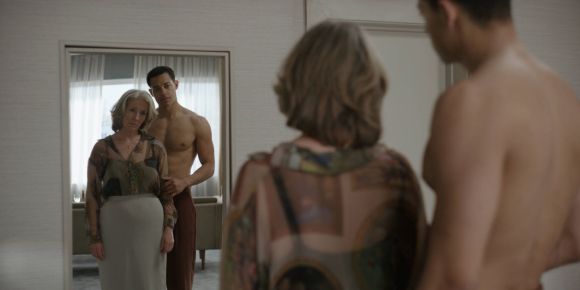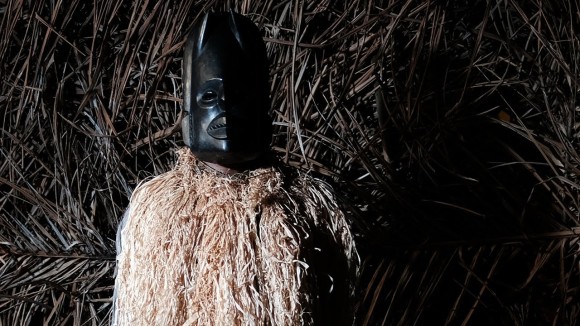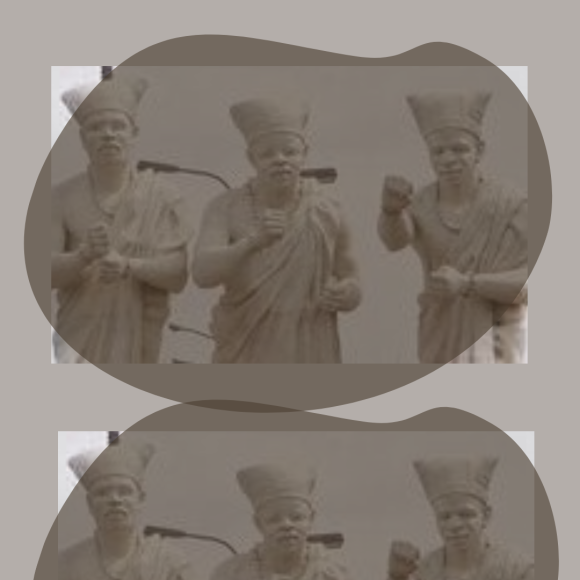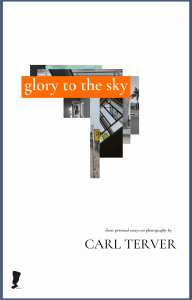
Carl Terver’s highly-anticipated photobook Glory to the Sky is now available for pre-order. Click image.
In the opening scene, we see the orange beanie of a man in white sleeves sitting in a café, facing the street through a window. The camera pans and shows us his face as daylight brightens, revealing a young, handsome Daryl McCormack, who we will come to know as Leo Grande, a sex worker in his 20s. In an alternating scene, a woman is in a long green coat, her back turned to us as she stands in a sparsely furnished but moderate hotel room. She takes a few steps, and when she takes off her coat, we see Emma Thompson, portraying Nancy Stokes, a 55-year-old widowed and retired religious education teacher. She checks her time, as the young man in the café: they both have an appointment. Their meeting was booked by the older lady, seeking to explore sexual desires. But a lot more unfolds.
Sophie Hyde’s Good Luck to You, Leo Grande is quite a solid movie, complex, yet simple, yielding onion-layered interpretations after several re-watch. This is not to say it isn’t an enjoyable movie—it is worth its 95-mins runtime for actual cinephiles. The idea of “what we see” is very important to this director, and more importantly, what we make of it. One of the first things we notice is the almost-cosmetic and dreamy isolation of the inhabitants on screen, as the camera dictates to our eyes what to see. This works, of course, until the viewer detaches from this spell and actually see the movie. Good Luck to You, Leo Grande has been praised for exploring and provoking discourse about the sexual desires of older women—a subject Nigerian writer Adam Abubakar Ibrahim treated in his novel Season of Crimson Blossoms. It is also praised for its positive representation of sex work. Only that these are merely surface-level concerns.
Has Nancy Stokes booked Leo Grande just for sex? Surely, she admits she selected him because of his good looks, even though it cost her a lot of money. But when she sees him, a sex worker with far more sexual experience than she who’s slept her whole life, having perfunctory sex, with only one man, her now late husband, she acts awkward and feels it was a bad decision to have made, booking him. “It feels very controversial,” she says, about pursuing her desires, “to want something like this, even to want it.” We understand it’s her superego kicking in. Leo Grande, though not much of a psychoanalyst, nudges her with a bit of pop philosophy, that it is not wrong to pursue one’s desires or feel lust. In fact, to go for it; surely one of the movie’s tenets. But we pause to wonder too: is Leo Grande just doing his job or making an existentialist point? We also imagine: is Leo Grande simply having one helluva day with another confused client?
Confusion is the secret in this movie, explored so well that Nancy ropes Leo Grande into it, exposing his own confusion. A backstory emerges later in the movie about 15-year-old Leo Grande, rejected by his religious mother for sexual depravity when she walked in on him and his friends having group sex. She’d said he became dead to her, Leo Grande tells us. Because the question of why sex workers go into sex work always arises, as Nancy herself is curious about Leo Grande, who uses words like “empirically,” “reductive,” and “ambivalent,” we are curious too. There isn’t enough information for us, but we imagine: did his mother’s rejection lead him to this line of work he professes to enjoy, for which he has had to learn people skills and other attractions to ultimately satisfy his clients? There are moments we sense in his countenance and nonverbal cues that Leo Grande isn’t proud of his job. There’s Nancy’s relentless confusion too, for her first time, perhaps, in confronting hypocrisy—she used to ask her students to write essays on the morality of sex work, she says—and her feelings of guilt for wanting sex or seeking to experience an orgasm which she has never had, plagued by the Victorian morality that shapes women like her.

Thus, what is supposed to be an appointment for sex segues into a therapeutic confrontation room of sorts. The fact that Nancy Stokes catches glimpses of her lost youthfulness and unexplored sensuality in Leo Grande—in a scene she obsesses over his body in an extremely naïve manner—and that Leo Grande wants to recover his mother, his object of loss, in Nancy Stokes, steer their conversations. A gradual relationship brews between them, although Leo Grande appears to be more in control of the boundaries. They both soon realise that the other person represents an idea of an answer to fill their emptiness. Nancy Stokes is more liberal and Leo Grande finds refuge in her, than he could find with his mother, and begins to help Nancy find some of that refuge too. In his attempt to guide her into arousal, a job she makes very difficult for him due to her moral ambivalence, Leo Grande unwittingly creates a bond between them. Towards the end of the movie, Nancy Stokes admits to wanting more—“I thought we’d build up a trust . . . I thought maybe we could continue outside of here, have a coffee.” Nancy Stokes had taken their “arranged” romance too far in finding out Leo Grande’s true identity, drawing his ire. And defends herself: “I am sorry that I had the audacity to find out the true identity of the man I’ve been having sex with for the past month.”
Read more
What can be unpacked in this expression of frustration? One of the things Good Luck to You, Leo Grande succeeds at is its criticism of this age’s lack of romance. Nancy Stoke’s frustration can be seen as the outcry of an age that has lost its capacity for love. We see it in the swipes on dating apps, in the increasing complaints of dissatisfaction, lies and betrayals in romantic relationships, with the ever-present question: what can be done about it? We have given into nihilism and reinforced our helplessness with empty axioms. Back to my question earlier: Has Nancy Stokes booked Leo Grande just for sex? It is a problem Leo Grande identifies when he tells her, “Everyone needs something different. Maybe you just want to talk?” Because when she forestalls actually having sex with her hired partner, she reveals a lot to him about herself and her life, as if he’s her lover or friend, and exudes unexpected intimacy. What are we to make of the idea that Nancy Stokes chooses an adventure of sex to fill her emptiness? And how often do we, too, find ourselves being Nancy?
With their onscreen romance and manner both persons seem to understand each other quickly, Sophie Hyde makes us wonder for a minute, what are the chances we meet our soul mates? Or, what are the possibilities of love? These definitely Nancy Stokes won’t find controversial; it is a high point for the movie in probing what is often taken so cavalierly today. For all its strengths, however, one still wonders—bringing us to the more immediate theme of the movie—why the director chose easy archetypes for the characters of Leo and Nancy. It is too convenient and facile that Nancy Stokes, an older, moralistic woman, is the person who has been sexually repressed (it’s sometimes the opposite case) and that young Leo Grande, the male figure, is the sexually adventurous one, and used as a foil to Nancy. What does this tell us of how men and women think about sex? It may be about perspective: either the stereotype is true or the representation in the movie reinforces it. This way, the movie somehow subverts its intended provocation; there should be more surprise, perhaps like we see in the choice of the main character in Hal Hartley’s Amateur (1994). Nonetheless, the charm of Good Luck to You, Leo Grande is its charm—that it wins, anyhow.♦
Edited by Divine Inyang.
Subscribe to Afapinen to read more essays like this.

Carl Terver is the author of Glory to the Sky (forthcoming August 2024). He writes on film, literature, and music, and is the founding editor of Afapinen. 𝕏
Carl Terver’s highly-anticipated photobook Glory to the Sky can now be pre-ordered. Click image below.













